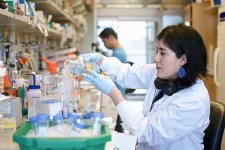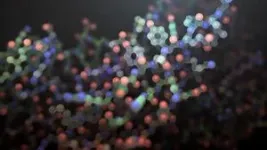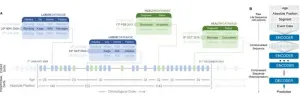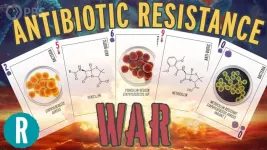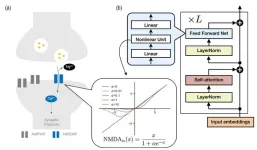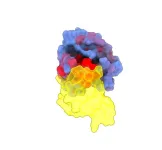(Press-News.org) A new study Dec. 18 in Nature reports an AI-driven advance in biotechnology with implications for drug development, disease detection, and environmental monitoring. Scientists at the Institute for Protein Design at the University of Washington School of Medicine used software to create protein molecules that bind with exceptionally high affinity and specificity to a variety of challenging biomarkers, including human hormones. Notably, the scientists achieved the highest interaction strength ever reported between a computer-generated biomolecule and its target.
Senior author David Baker, professor of biochemistry at UW Medicine, Howard Hughes Medical Institute investigator, and recipient of the 2023 Frontiers of Knowledge Award in Biology and Biomedicine, emphasized the potential impact: "The ability to generate novel proteins with such high binding affinity and specificity opens up a world of possibilities, from new disease treatments to advanced diagnostics."
The team, led by Baker Lab members Susana Vazquez-Torres, Preetham Venkatesh, and Phil Leung, set out to create proteins that could bind to glucagon, neuropeptide Y, parathyroid hormone, and other helical peptide targets. Such molecules, crucial in biological systems, are especially difficult for drugs and diagnostic tools to recognize because they often lack stable molecular structures. Antibodies can be used to detect some of these medically relevant targets but are often costly to produce and have limited shelf lives.
"There are many diseases that are difficult to treat today simply because it is so challenging to detect certain molecules in the body. As tools for diagnosis, designed proteins may offer a more cost-effective alternative to antibodies," explained Venkatesh.
The study introduces a novel protein design approach that uses advanced deep-learning methods. The researchers present a new way of using RFdiffusion, a generative model for creating new protein shapes, in conjunction with the sequence-design tool ProteinMPNN. Developed in the Baker Lab, these programs allow scientists to create functional proteins more efficiently than ever before. By combining these tools in new ways, the team generated binding proteins by using limited target information, such as a peptide's amino acid sequence alone. The broad implications of this "build to fit" approach suggest a new era in biotechnology in which AI-generated proteins can be used to detect complex molecules relevant to human health and the environment.
"We're witnessing an exciting era in protein design, where advanced artificial intelligence tools, like the ones featured in our study, are accelerating the improvement of protein activity. This breakthrough is set to redefine the landscape of biotechnology," noted Vazquez-Torres.
In collaboration with the Joseph Rogers Lab at the University of Copenhagen and the Andrew Hoofnagle Lab at UW Medicine, the team conducted laboratory tests to validate their biodesign methods. Mass spectrometry was used to detect designed proteins that bind to low-concentration peptides in human serum, thereby demonstrating the potential for sensitive and accurate disease diagnostics. Additionally, the proteins were found to retain their target binding abilities despite harsh conditions including high heat, a crucial attribute for real-world application. Further showcasing the method's potential, the researchers integrated a high-affinity parathyroid hormone binder into a biosensor system and achieved a 21-fold increase in bioluminescence signal in samples that contained the target hormone. This integration into a diagnostic device highlights the immediate practical applications of AI-generated proteins.
The study, which illustrates the confluence of biotechnology and artificial intelligence and sets a new precedent in both fields, appears in Nature with the title “De novo design of high-affinity binders of bioactive helical peptides.”
This work was supported by the National Institutes of Health (T1D U01 DK121289, U19 AG065156, K99EB031913, P30 GM124165), National Science Foundation (EF-2021552), Department of Energy (BER-ERCAP0022018; DE-AC02-06CH11357), European Molecular Biology Organization (ALTF 292-2022), Washington State General Operating Fund, Amgen, Audacious Project, AWS, Bill and Melinda Gates Foundation (INV-010680), Donald and Jo Anne Petersen, Howard Hughes Medical Institute, Microsoft, Novo Nordisk Foundation (NNF19OC0054441), Open Philanthropy Project, and Partnership for Clean Competition.
Written by Ian Haydon, Institute for Protein Design
END
AI generates proteins with exceptional binding strengths
The advance could allow scientists to develop cheaper alternatives to antibodies for disease detection and treatment.
2023-12-18
ELSE PRESS RELEASES FROM THIS DATE:
Artificial intelligence can predict events in people's lives
2023-12-18
Artificial intelligence developed to model written language can be utilized to predict events in people's lives. A research project from DTU, University of Copenhagen, ITU, and Northeastern University in the US shows that if you use large amounts of data about people's lives and train so-called 'transformer models', which (like ChatGPT) are used to process language, they can systematically organize the data and predict what will happen in a person's life and even estimate the time of death.
In a new scientific article, 'Using Sequences of Life-events to Predict Human Lives', published ...
Einstein receives $10.9 million grant to validate remote cognitive testing for Alzheimer’s and other dementias
2023-12-18
December 18, 2023—(BRONX NY)—Neurologists often diagnose Alzheimer’s disease after evaluating patients during lengthy, in-person office visits. This poses a significant challenge for many groups, particularly people with limited access to specialized care, including people from historically marginalized groups and people living in rural areas.
Albert Einstein College of Medicine has received a five-year, $10.9 million grant from the National Institutes of Health (NIH) to study whether remote neuropsychological testing can substitute for in-person office visits when assessing whether people have Alzheimer’s disease or other dementias.
“In-person ...
The antibiotic resistance war (video)
2023-12-18
WASHINGTON, Dec. 18, 2023 — There’s a microscopic battle happening right before our eyes, involving the critical issue of antibiotic resistance. Witness the historical development of antibiotics, from penicillin's accidental discovery to the ongoing battle against superbugs. https://www.youtube.com/watch?v=OCR5wFWSGlA
Reactions is a video series produced by the American Chemical Society and PBS Digital Studios. Subscribe to Reactions at http://bit.ly/ACSReactions and follow us on Twitter @ACSReactions.
The American Chemical Society (ACS) is ...
AI's memory-forming mechanism found to be strikingly similar to that of the brain
2023-12-18
An interdisciplinary team consisting of researchers from the Center for Cognition and Sociality and the Data Science Group within the Institute for Basic Science (IBS) revealed a striking similarity between the memory processing of artificial intelligence (AI) models and the hippocampus of the human brain. This new finding provides a novel perspective on memory consolidation, which is a process that transforms short-term memories into long-term ones, in AI systems.
In the race towards developing ...
15th annual horizon scan identifies 15 most pressing issues for conservation, including invertebrate decline and changing marine ecosystems
2023-12-18
Since 2009, the Cambridge Conservation Initiative has coordinated an annual horizon scan, a well-established method for predicting which threats, changes, and technologies will have the biggest impact on biological conservation in the following year. This year, the 15th horizon scan included 31 scientists, practitioners, and policymakers who developed a list of 96 issues, which they eventually narrowed down to the fifteen most novel and impactful. Their findings, publishing in the journal Trends in Evolution & Ecology ...
Toothbrushing tied to lower rates of pneumonia among hospitalized patients
2023-12-18
Toothbrushing also associated with lower rates of ICU mortality, shorter duration of mechanical ventilation, and shorter ICU length of stay
Researchers say toothbrushing could be a cheap but effective way to help lower rates of hospital-acquired pneumonia
Researchers have found an inexpensive tool that may help reduce rates of pneumonia for hospitalized patients—and it comes with bristles on one end. A new study by investigators from Brigham and Women’s Hospital, a founding member of the Mass General Brigham healthcare system, and Harvard Pilgrim Health Care Institute ...
Ecosystem benefits to humanity expected to decline by 9% by 2100
2023-12-18
As climate change redistributes terrestrial ecosystems across the globe, the world’s natural capital is expected to decrease, causing a 9% loss of ecosystem services by 2100. That’s according to a study of natural capital published today in the journal Nature led by scientists at the University of California, Davis, and Scripps Institution of Oceanography at UC San Diego.
Breathable air, clean water, healthy forests and biodiversity all contribute to people’s well-being in ways that ...
Public benefit programs and differential associations with child maltreatment by race and ethnicity
2023-12-18
About The Study: The results of this study raise concerns that benefit programs may add relative advantages for white children compared with Black and Hispanic children and contribute to racial and ethnic disparities in child protective services investigations. States’ eligibility criteria and distribution practices should be examined to promote equitable effects on adverse child outcomes.
Authors: Henry T. Puls, M.D., of Children’s Mercy Kansas City, is the corresponding author.
To access the embargoed study: Visit our For The Media website ...
Association between daily toothbrushing and hospital-acquired pneumonia
2023-12-18
About The Study: The findings of this systematic review and meta-analysis of 15 randomized clinical trials with an effective population size of 2,786 patients suggest that daily tooth brushing may be associated with significantly lower rates of hospital-acquired pneumonia, particularly in patients receiving mechanical ventilation, lower rates of intensive care unit (ICU) mortality, shorter duration of mechanical ventilation, and shorter ICU length of stay. Policies and programs encouraging more widespread and consistent toothbrushing ...
Secret vulnerabilities of cancer’s ‘death star’ revealed
2023-12-18
Researchers at the Centre for Genomic Regulation in Barcelona, Spain, and the Wellcome Sanger Institute near Cambridge, UK, have comprehensively identified the allosteric control sites found in the protein KRAS. These are highly sought after targets for drug development, representing secret vulnerabilities which can be exploited to control the effects of one of the most important causes of cancer. The study presents the first complete control map for any protein and is published today (18 December) in the journal Nature.
KRAS ...
LAST 30 PRESS RELEASES:
Yale study challenges notion that aging means decline, finds many older adults improve over time
Korean researchers enable early detection of brain disorders with a single drop of saliva!
Swipe right, but safer
Duke-NUS scientists identify more effective way to detect poultry viruses in live markets
Low-intensity treadmill exercise preconditioning mitigates post-stroke injury in mouse models
How moss helped solve a grave-robbing mystery
How much sleep do teens get? Six-seven hours.
Patients regain weight rapidly after stopping weight loss drugs – but still keep off a quarter of weight lost
GLP-1 diabetes drugs linked to reduced risk of addiction and substance-related death
Councils face industry legal threats for campaigns warning against wood burning stoves
GLP-1 medications get at the heart of addiction: study
Global trauma study highlights shared learning as interest in whole blood resurges
Almost a third of Gen Z men agree a wife should obey her husband
Trapping light on thermal photodetectors shatters speed records
New review highlights the future of tubular solid oxide fuel cells for clean energy systems
Pig farm ammonia pollution may indirectly accelerate climate warming, new study finds
Modified biochar helps compost retain nitrogen and build richer soil organic matter
First gene regulation clinical trials for epilepsy show promising results
Life-changing drug identified for children with rare epilepsy
Husker researchers collaborate to explore fear of spiders
Mayo Clinic researchers discover hidden brain map that may improve epilepsy care
NYCST announces Round 2 Awards for space technology projects
How the Dobbs decision and abortion restrictions changed where medical students apply to residency programs
Microwave frying can help lower oil content for healthier French fries
In MS, wearable sensors may help identify people at risk of worsening disability
Study: Football associated with nearly one in five brain injuries in youth sports
Machine-learning immune-system analysis study may hold clues to personalized medicine
A promising potential therapeutic strategy for Rett syndrome
How time changes impact public sentiment in the U.S.
Analysis of charred food in pot reveals that prehistoric Europeans had surprisingly complex cuisines
[Press-News.org] AI generates proteins with exceptional binding strengthsThe advance could allow scientists to develop cheaper alternatives to antibodies for disease detection and treatment.
